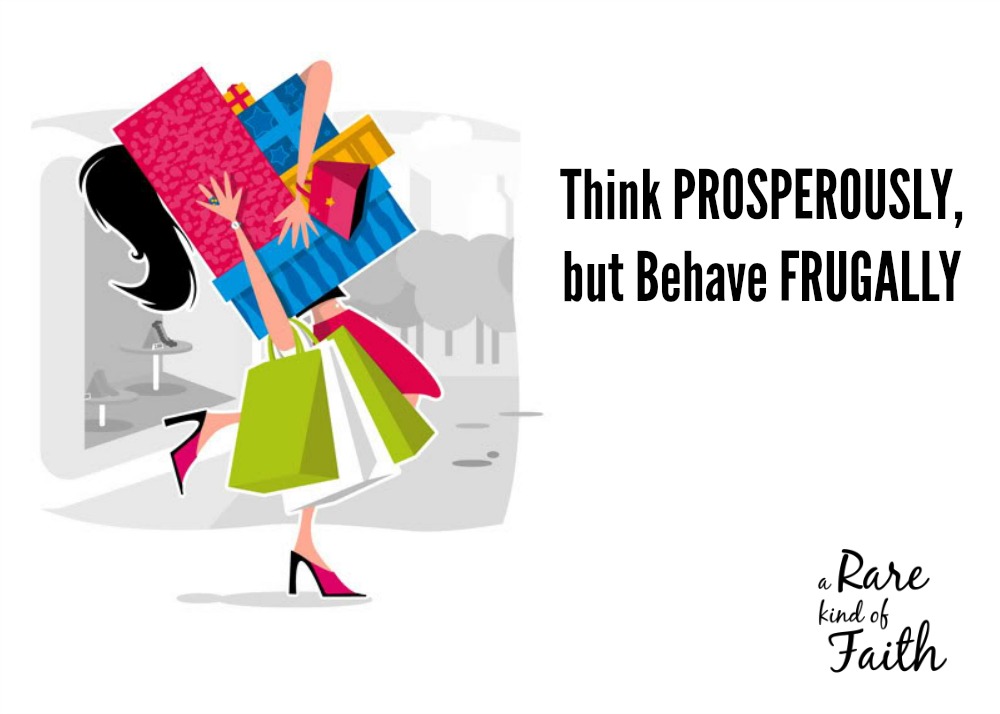Here is a question from one of my readers that I thought was worthwhile to share with you.
Question:
How do you think, especially speak, feel, and act as though you are rich, and…
A. not spend money you don’t have?
B. still give positive responses as though the money is here now to people asking you to do things you don’t have the money for???
How do you “feel” like the money is here now, when you see something you want to buy, and can’t responsibly do that?
My Answer:
You can accomplish the “feel” task during a quiet moment of meditation – a finite length of time. Sometimes I’ll just go lay down for a nap and let myself daydream and feel the abundance I’m hoping for, and allow my mind to experience its reality, even if it is just for a few minutes. That’s planting the seed, and turning it over to the subconscious.
Then when you’re back to life as usual, behave responsibly. Say no when an irresponsible purchase is tempting you. Determine the difference between an irresponsible purchase and one that may lead you to the solutions you are searching for.
If you have planted the seed, then you will be led to opportunities, and there may be a twinge of fear in taking advantage of them, but it is a different kind of fear than the kind that accompanies frivolous purchases. Deep down, if you have a clear vision of where you ultimately want to be, you’ll know the difference. If it’s the kind of fear that prevents your progression, then it is worth facing. If it is the kind of fear that protects you from making a mistake, then pay attention to it.
How can you know the difference? If you spend the time visualizing and feeling like I’ve suggested, then when the fear comes, you’ll know in your gut which kind it is.
Out of all I’ve just said, the part that most people will NEVER do is to take the time to daydream, visualize, and FEEL, and approach it like a task on their to-do list. Do it, then check it off, and watch for the opportunities to come. Do it, and notice how much more clearly it is to discern a distraction or trap from an opportunity.
When you get confused or fearful, do it again, check it off, and move your feet forward, expecting clarity to come as you go.
Be smart with your spending, only live abundantly in your mind, enjoying the “experience” of virtual prosperity, but then live life as normal. In time, circumstances will re-arrange themselves to open the right doors and bring you the right opportunities, until reality can reflect the images of your thoughts.
Optimism will lead you to financial solutions, but be smart and live responsibly in the here and now.
Above all, stick to sound principles. We got caught a big debt trap even several years after learning these principles, because we got too excited about changing things too quickly. It was a painful lesson to learn, so now I discourage you from using credit to purchase my trainings or products. I’ll tell you instead to read The Jackrabbit Factor FREE, and do what it teaches to obtain the money you need.
I strongly advise you to give 10% to charity and save 10% of your earnings as well, no matter what you make. If you can’t, then get another or better job, or cut back on your lifestyle. Yes, I just said that.
Build a solid financial foundation. Do the hard things now on the way to your dream. Establish sound financial habits that will follow you into prosperity. If you are careless with the little money, you’ll be careless with the big money. It happened to us. It’s pretty much a law of nature: human nature.
Pay attention to the market trends and don’t get caught up in the frenzies. There will always be ups and downs. And ups. If you missed a window of opportunity, just put your life and house in order so that you’ll be ready for the next one. Practice delayed gratification.
You might be surprised to know that we are not paying for our children’s educations – we’re teaching them that they will need to earn the money or get scholarships. We are teaching them to avoid debt like the plague, even for their education. So far so good. I hope they stick to it, even if it takes them longer to finish. I tell them to sacrifice, work, think long term, and watch the opportunities come. I believe God honors and blesses those who practice wisdom.
He also lets us do stupid things, so trust me – be wise. Be the weird one in your circle of friends who doesn’t have all the luxuries, because you’re working a long-term plan. As the old adage goes, the last shall be first and the first shall be last.
All the while, practice the principles of right-thinking. Have faith. Think optimistically. Create a vision for where you’re going. Trust in the Law of Rhythm, and the Law of Polarity, and the Law of Vibration, especially. Read all about these laws FREE, here.
When you’re out shopping with your kids and they beg you to buy something, don’t say, “I can’t.” Instead say, “I choose not to spend my money on that.” Speak to empower. Even if you can’t afford it, your mind will hear and feel the response “I choose” differently than “I can’t.” And it time, you’ll see the effects. When the words you speak are in line with correct principles, your life can’t help but begin to move in a better direction. Originally published September 12, 2006
Related: To Debt or Not To Debt. Learn how the way you feel about the purchase can also affect the overall outcome.
- Trusting in the Master Plan - December 13, 2024
- Zeffy-grant - November 21, 2024
- The Rare Faith Book – Part 1 - November 20, 2024


















10 Responses
Great article! I would also like to add that most of the wealthy people that I know and strive to be like are quite frugal people. They don’t live extravagantly, they don’t squander their money, and they have their long term goals firmly in place. Which leads them to making correct decisions about money. It is often the mindset that if I were wealthy, I would have nice things, I wouldn’t shop at Walmart, my fridge would always be filled and I’d have an endless supply of everything I could ever want and need. I’ve found that most of the wealthy people I know, have about as many day to day clothes as I have, run out of food in their fridges sometimes, and have found that there is an endless amounts of wants and needs and gave up on trying to acquire them. They tend to buy what is helpful and useful when they need it, they buy high quality items so they don’t have to think about replacing them if they were to break, and don’t spend much of their money on wants very often. After setting up their homes, money is spent on a nice trip here, an educational opportunity there, or a special occasion or a celebration. Day to day is similar to everyone else, with the exception of the understanding that they can have more, if they want. It has become quite easy for me to see myself as wealthy and living abundantly after spending time with real, actual wealthy people that live lives that align with my values. I can see that not that much is really different except for the understanding that they could have that if they wanted, typically though, they don’t want trivial things to manage and care for and end up not purchasing. They understand the relationship of possession and management. The things I possess then become part of the things I manage, do I want to share my bandwidth with that item bad enough? Do I feel like managing that item would be worth my energy and the precious space in my home and heart. Do I want to take a stewardship responsibility over yet another item. Typically, the answer I’ve seen is, nope. Tom Stanly has written a few books on this subject and I’ve found through my own research that he is absolutely correct. I have also found that regardless of how much income we have, we are abundantly blessed right now and have been every day of our lives, that abundance is all around us, and is freely given to us if we but look for it.
Excellent insights!
I love love love this ♥️♥️♥️
Leslie, You have the heart of a teacher and I so appreciate how you talk so plainly about things. Every time I read something you wrote I am blessed. This is no exception 🙂
So how do we “feel” the abundance when we’ve been trying for 80 years and nothing ever seems to work?
Hi Bob! If you imagine it vividly enough that your brain thinks it’s actually happening, it releases the chemicals that cause the feeling. this is the piece that we heard about for 7 years and kind of thought we were doing it but weren’t. Things started to change when I did it intentionally and then didn’t constantly wonder if it worked. I just did it and then went about life as usual, not even thinking about it. I didn’t wonder if it worked because I didn’t do it to make something happen. When I did it, I only did it for an escape, because I didn’t like the way things were in reality. Afterward, I didn’t doubt, because it was simply out of my mind. I’ve learned that the key isn’t the amount or degree of intensity, the real key is simply the absence of doubt!
I love that you give what we can use and apply. That is a something I greatly appreciate in teachers is when they give a specific replacer to what we are eliminating. I would like even more suggestions and applications to these common things we come across. This is a great post. Thank you.
So, I have a question… what do you do if you don’t “feel” things? This is the part that I am yet to understand…
Hi Cate, I’ve answered this question in another post; you can read it here.
Great advice and good distinctions. One thing I might add is to watch your language. Often when someone is living responsibly and frugally, the answers to questions about buying or going out are answered with “I can’t afford it.” or “That’s way too much money.” or “i’ll never be able to do stuff like that.” This shows feelings of lack. Instead answer “not today” or “I choose not this time” or “I already have plenty, thanks.”